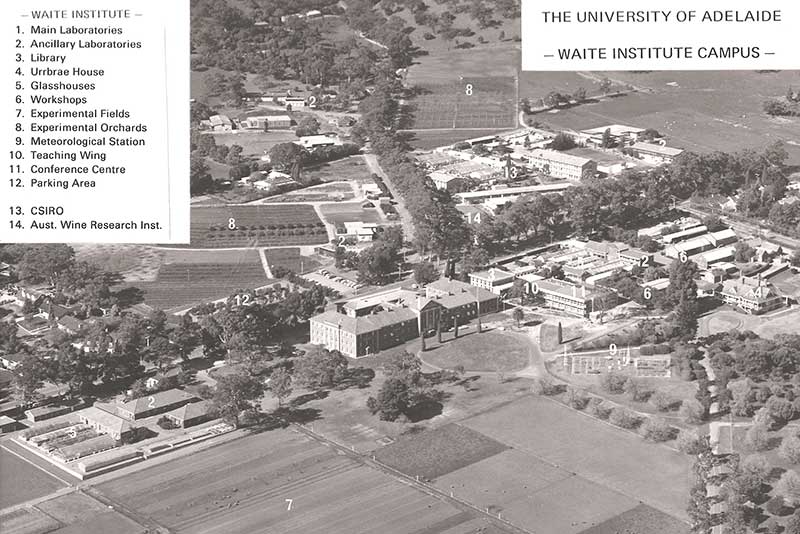The data
The University of Adelaide (UoA) were interested in using Waite Permanent Rotation Trial datasets (1925 – 1993) to investigate the interaction of genotype, environment, and management over the past decades with the possibility of using this historic data in predictive crop modelling.
The challenge
Although The Waite Trial datasets were publicly available, the data was stored as individual MS Excel files and sometimes data was color coded. This made it difficult to reuse and combine with other data for predictive crop modelling.

Arial view of the Waite Campus 1976, showing the experimental fields (7) where the trial was conducted
The solution
With the support of AgReFed partners, UoA researchers worked together with their library and IT support to bring together and deliver the Waite Trial dataset in a standard format.
- The Waite Permanent Rotation Trial legacy data was converted from multiple MS Excel worksheets into a consistent and structured format (MySQL database)
- Meaning was added to the data by using machine-readable agricultural terms and standard terms (such as 'units of measure') with the assistance of Research Vocabularies Australia support staff
- The data is hosted at Pawsey Supercomputing Centre, and is accessible through AgReFed via PostgREST API
Both Researchers and machines can now access and understand the Waite Trial dataset, search the parameters of interest within these datasets (including across a specified period of time), and access the data in analysis-ready format.
The impact
Research insights
The Waite Historical Permanent Rotation Trial datasets (1925 – 1993) are available as they never have been before.
Researchers can now search and filter the variables of interest. Importantly, they will also know what the data means, since it is described with permanent web addresses leading to standard agricultural descriptions (controlled vocabularies).
The historic trial data is now accessible in analysis ready formats through AgReFed, including in machine readable format. It is reusable for predictive crop modelling under future climate and management scenarios, for example through integrating with climate data.
Practice change

Dr Rakesh David
Postdoctoral Fellow Dr Rakesh David states that he could
“assess the FAIRness of other data sets are now” and “understands the components required to make data accessible.”
Rakesh now
“knows how to go about applying vocabularies” and “will attempt to apply known standards to future research datasets.”
The future
The UoA team hope to continue to collaborate with crop researchers through AgReFed do deliver and describe crop trial data in a standard way.
By working on this together, researchers will be able to combine their datasets for more powerful predictions of crop success under future climate and management scenarios.


